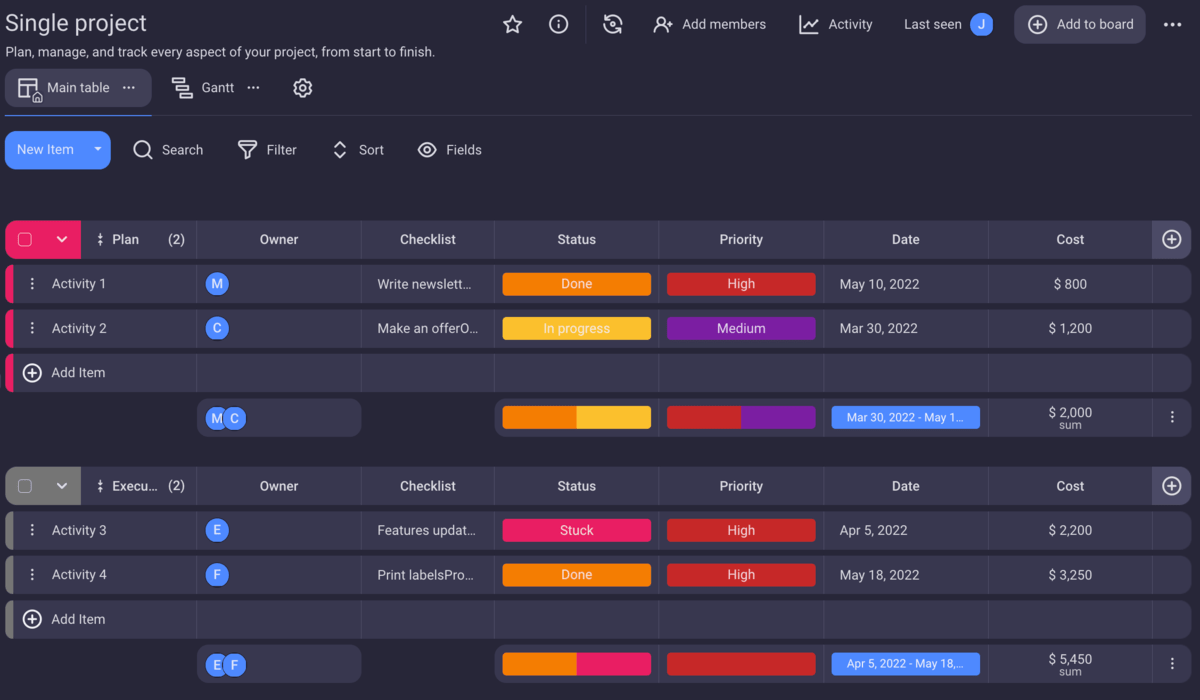If a business wants to be successful in achieving its strategic objectives, it should improve its project management capacities. To do this, many businesses seek consultants’ assistance.
This blog post will help you learn everything you need to know about:
- Project management consultancy,
- Project management consultants, and
- The difference between project management consultants and project managers.
Also, this text will offer you tips on how to become a successful project management consultant.

Project management consultancy definition
A project management consultancy is a type of business that offers expert advice and recommendations to clients regarding project management.
A company can seek temporary professional aid if it lacks project management expertise or needs advice from an external party.
Project management consultancies can help businesses in resolving problems related to leadership, operations, performance, and more.
To accomplish this, these consultants work closely with said companies.
💡 Plaky Pro Tip
If you want to know more about how you can use Plaky to boost your consulting business, we have just the article for you:
Who is a project management consultant?
A project management consultant’s job is to offer advice or recommendations regarding project management and give support to businesses that need it.
They possess the relevant skills and knowledge to help guide businesses to make the right decisions throughout the project lifecycle.
Project management consultants use different tools and techniques to ensure that projects are executed properly and efficiently.
What are the project management consultant’s responsibilities?
The roles of the project management consultant are many. But, some of their main duties could involve:
- Getting familiar with the business of the company,
- Directing some aspects of the projects including guiding members of a project team, assisting the project manager in creating a sound strategy, assessing project risks, and more,
- Helping in the proper distribution of the available project resources,
- Developing innovative solutions that help achieve organizational goals,
- Analyzing business-related data to identify problems in projects before they arise,
- Setting up project management strategies,
- Creating project plans,
- Creating roadmaps, and
- Advising the project team in areas of their immediate expertise.
What skills do project management consultants need?
The list of skills required for a project management consultant to possess is quite long. However, here are the 6 most important ones.
Skill set #1: Organizational skills
Project management consultants are often involved in consulting about many different aspects of the project, which they need to organize and arrange in a way that would yield the best possible project results in a limited time. Therefore, they need strong organizational skills, such as project prioritization, planning, decision-making, and similar.
These skills enable them to reduce project risks and increase the quality of the client’s project.
Skill set #2: Technical skills
Due to the nature of their job, project management consultants should have certain technical skills and knowledge in their specialized field.
For instance, if a person is hired as a consultant at a construction company, they should know some construction basics. Also, if a consultant works for an IT company, they should possess sufficient software development knowledge to help guide the project.
This will enable them to offer more useful advice while helping a project along. These skills can be gained through specialized education, courses, and training.
Skill set #4: Analytical skills
Project management consultants should possess analytical skills as their job is to analyze sections of the project which need improvement.
Their job requires critical thinking, which allows them to understand the state of the project but also the market the project is created for.
Additionally, the ability to conduct good research is really important in order to be able to collect all the information needed.
Analytical skills enable them to make decisions and develop sound business strategies.
Skill set #5: Management skills
Management skills are highly important for project management consultants as they help project managers guide the project team in the right direction.
Strong management skills can help both the consultants and the team work more efficiently.
For example, they need to be good at coaching and mentorship, as they need to help guide the project team in the right direction.
Additionally, problem-solving skills are required when dealing with issues that appear while working on the project.
Skill set #6: Interpersonal skills
The ability to communicate well with the team is paramount for completing projects and overcoming challenges.
Project consultants need to possess strong interpersonal skills to be able to convey ideas and tasks effectively through reports, presentations, emails, and other means of communication.
They should be good listeners as well. Project management consultants should listen to the suggestions and problems that they get from the clients or team members so that they can adequately help them improve the project.
As project management consultants work with different teams they’re usually unfamiliar with, finding common ground is very important in order to align goals and expectations.
How much does the project management consultant earn?
According to Glassdoor, the average salary of a project management consultant is $106,090 per year, making this a highly desirable position in the project management niche.
The salary that the project management consultant makes depends on the experience they have, their education, and their specialization.
Depending on these factors, the project management consultants make anywhere between $82,000 and $139,000.
The highest salary for project management consultants in the United States is $140,388 per year.
What is the difference between a project management consultant and a project manager?
Even though the role of the project management consultant is quite clear, there is still some confusion between project management consultants and project managers.
Both of these professionals can work together throughout the lifecycle of a project. However, the project manager is an internal member of the company’s team, whereas the project management consultant is a third-party whose service a company can seek if needed.
The project manager is the one leading the project toward successful completion. They are in charge of the team, resources, materials, and deadlines.
On the other hand, the project management consultant is hired to provide expertise for the areas that are outside of the company’s expertise.
The consultants may help managers choose the right strategies for the execution of the project.
They might also be hired to review and revise the current project management processes within the company, especially if similar projects in the past have been unsuccessful.
How much does project management consulting cost?
The price that a company will pay for consulting varies depending on different factors such as education, certifications, experience, skills etc. The more a consultant has been in the industry, the more their services are likely to cost.
According to Salary.com, the average hourly wage that project management consultants make amounts from $39 to $48.
The lowest project management consultant hourly wage is $34, while the highest is $53.

How to become a project management consultant?
If you’re looking to become a project management consultant, we have some tips for you.
First, here are 3 signs a person is ready to become a consultant:
- They have enough project management experience and mastery over the relevant skill set.
- They have a well-developed network of clients, coworkers, and peers who they can contact for help and advice.
- They are stable financially and ready to make a risky professional move.
Now, let’s look at some important steps that can help with becoming a project management consultant.
Step #1: Gain relevant education
A bachelor’s degree in marketing, business administration, or finance is usually necessary for the position of a project management consultant. This degree will help you obtain the necessary skills for the job. Furthermore, getting a master’s degree will help you get a deeper understanding of the project management consulting sphere.
If you don’t have it already, you should also look into obtaining a project management certification which will improve your project management competency. It will also help you appear better qualified in the eyes of potential clients.
Step #2: Get relevant experience
While degrees and certificates are important, you should only consider becoming a project management consultant after you’ve had a significant amount of experience working as a project manager.
Project managers’ practical experience helps prepare them for the role of project management consultant.
Step #3: Identify your strengths
In order to identify your strengths, you should think about the industries you worked in as a project manager and decide whether you will specialize in certain areas or not.
You should also think about your weaknesses as a project manager and work on improving in these areas. You can do so by enrolling in different courses before becoming a project management consultant.
For example, if you’ve had problems with conflict resolution in the past, you may want to join a workshop on the subject to better understand how you can improve in that department.
Step #4: Learn how to market yourself
After identifying your strengths and the unique services you can offer, you have to learn how to market yourself.
You should be able to successfully spread the word about your services and find potential clients. Consider creating a website and other promotional material or hire a marketing expert who will help you with advertising.
Step #5: Continue building your network
Expanding your network of people is crucial for consultants. You should work on maintaining good relations with existing clients, colleagues, and peers while looking to expand your professional network.
You can do so by attending networking events in your industry and joining professional organizations and associations.
💡 Plaky Pro Tip
For more practical project management tips, check out the following blog post:
Step #6: Find a suitable tool to manage your consulting projects
It is very important that you decide on the tools you will use for managing your projects, keeping track of the their progress, and communicating with the clients.
A useful project management tool that consultants can use is Plaky. Plaky is a project & task management software that will enable you to manage all your ongoing projects in one place.
The requests you get from your clients will be diverse, but Plaky is highly customizable. It allows you to personalize your workflow any way you want and create separate boards for each client.
Furthermore, Plaky enables you to have all the documents and information in one place.
Also, you can collaborate with your clients directly on the platform. For example, you can share progress and information with them.

💡 Plaky Pro Tip
If you need help with choosing the right tool for your needs, check out the following article:
Conclusion: Project management consultancies help businesses successfully finish their projects
The execution of projects can be a tricky job. That is why many companies choose to hire a project management consultant to help guide them.
Project management consultants give professional advice and develop strategies that help projects be successful.
Whether you want to hire a project management consultant or become one, it helps to know what exactly these professionals do. We hope this article has helped you gain a better understanding of their role.
✉️ Do you have any additional questions about project management consultancy and project management consultants? Are there any dilemmas regarding their tasks and skills? If so, feel free to contact us at blogfeedback@plaky.com, and we may include some of your ideas in our future blog posts. Also, if you liked this post and found it useful, share it with someone who will benefit from it!
